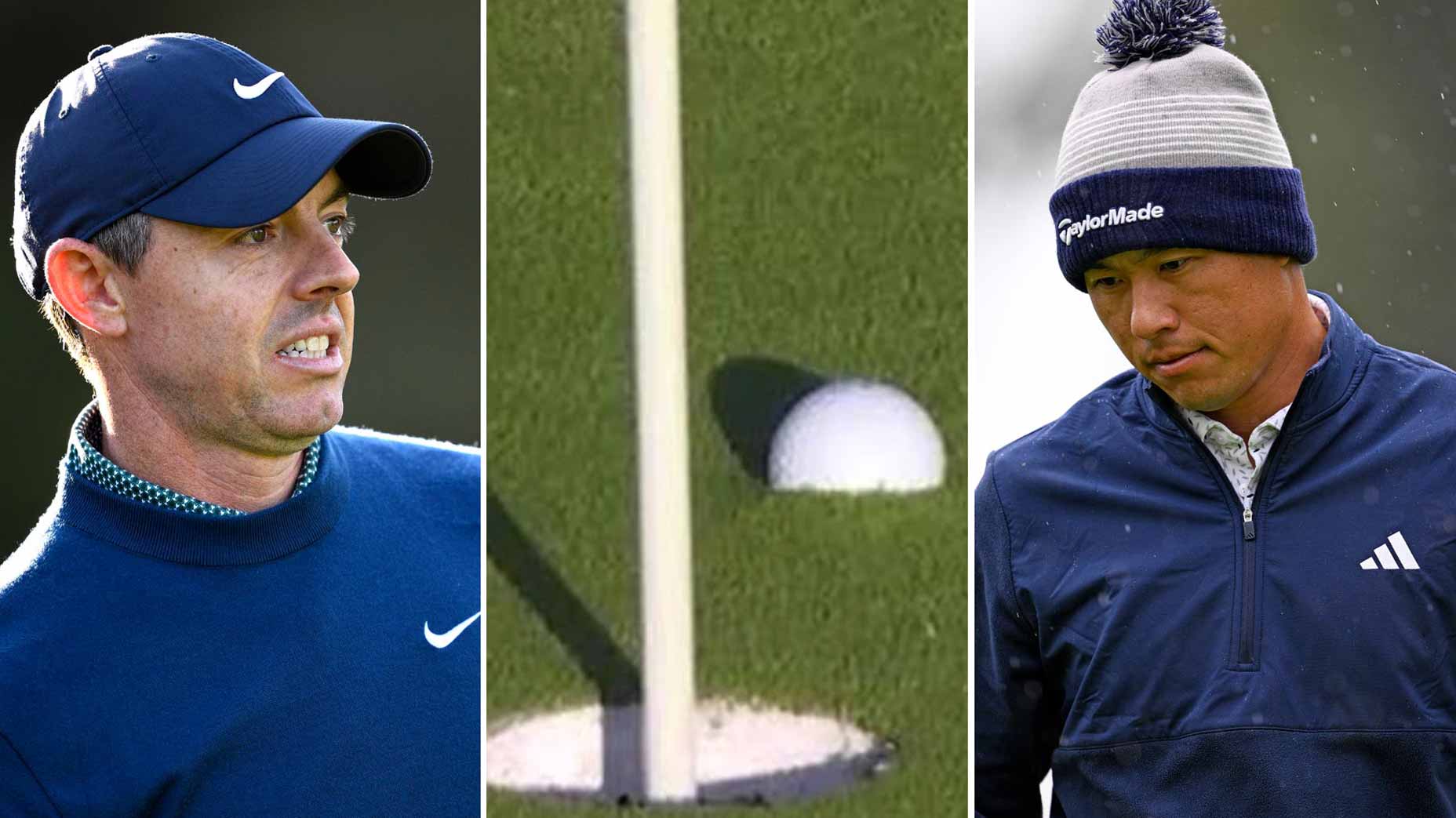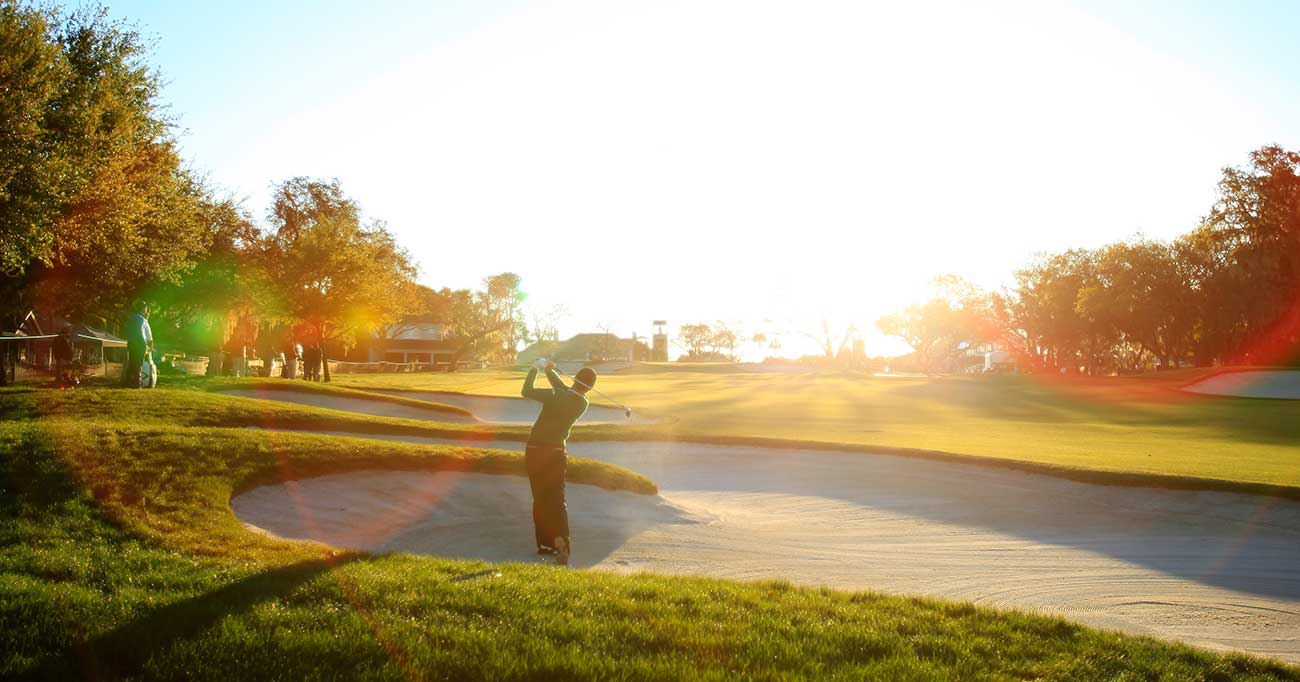 ‘Purely hit and hope’: Riviera’s soaked greens flummox PGA Tour stars at Genesis
‘Purely hit and hope’: Riviera’s soaked greens flummox PGA Tour stars at Genesis
Under stay-at-home orders, can you still play golf? It’s complicated

On Thursday morning in New York, the stores, salons and sidewalks were empty. But the tee sheets at Bethpage State Park were jammed. Though the famous Black Course, host of multiple major championships, has yet to open for the season, three other state-run courses at Bethpage — the Blue, Yellow and Green — have been welcoming golfers. They’re among the exceptions to a statewide stay-at-home order that has shuttered “non-essential” businesses while allowing certain outdoor activities in state parks to continue.
“We’re following all the safety protocols, both on and off the courses,” said Kelley Brooke, managing partner at the Bethpage Golf Group. “And the golfers who are coming out are happy to be here. For them, we are a much-needed escape.”
At many nearby courses, though, no such luck. All of the New York City municipal courses, for example, some of which are just 20 miles west of Bethpage, are closed. Different jurisdictions. Different rules. And a study in contrasts, within the New York metropolitan area, that reflects the inconsistencies and confusion now clouding the golf industry nationwide.
As the coronavirus outbreak tears across the country, a grey area has engulfed much of the game. From city to city, county to county and state to state, varying mandates have kicked up questions. Many recreational golfers, golf organizations and course operators alike have been left to wonder not only whether and how golf can be pursued safely but also if it’s permissible to play the game at all.
“At this point, we’re seeking clarity,” said Chris Whitten, executive director of the Golf Association of Michigan.
CAN YOU PLAY GOLF IN YOUR STATE? FIND OUT HERE
On Tuesday morning, just after midnight, Michigan’s governor issued a statewide stay-at-home order, but the language in it does not specifically mention golf. How to interpret it is the question, because a prior statewide declaration, issued last week, allowed for golf courses to stay open, with restrictions on food and beverage, and other services.
“We don’t know yet whether this new order overrides the prior one,” Whitten said. “We’re trying to get that figured out.”
Whatever clarity emerges in Michigan, it might not be the same as what now holds in Illinois, where the state is allowing golfers to play on, but without carts. In Wisconsin, meanwhile, the state has ordered that golf courses cease operations altogether.
Elsewhere in the country, a hodgepodge applies. Take Florida, for instance, where the governor has not ordered golf courses to shutter. In large swaths of the state, public courses remain open, but Palm Beach County courses have closed. Two prominent private clubs in that area, Seminole and Lost Tree, have reportedly canceled all member and member-guest tournaments for the rest of the season. At The Villages, a retirement community in central Florida with a median age of 72 and a famously party-happy atmosphere, large social gatherings have been put on hold, dampening the spring break-for-seniors mood. But golf continues. “This is The Villages,” one resident told the Orlando Sentinel. “There would be a riot if they stopped golf.”
The game is also being played at myriad resorts, including Streamsong, about an hour’s drive east of Tampa, which is requiring those who don’t walk to ride as singles in carts. The courses at Pinehurst are also still open. Other top-shelf golf resorts have shut down, including Pebble Beach, Sea Island and Bandon Dunes.
In the midst of an unprecedented crisis, many state governments, overburdened with more pressing matters, have deferred golf-related decisions to county health departments, parks and recreation divisions, and other local governing bodies. Hence the patchwork rules and regulations. But in Arizona, where golf is in peak season, a time when courses usually make hay before the swelter of the summer, Gov. Doug Ducey has issued an executive order prohibiting cities from shutting down “essential” services. Included on the governor’s list of such services is golf.
Though no one will say it publicly, some in the industry have suggested that the status of golf in different areas of the country hinges, at least partly, on the political leanings of those in charge. But party affiliation may be less important than plain-old familiarity with the game.
ADVERTISEMENT
“If you understand golf, you know that it can be played with every bit as much social distancing as a lot of other activities that are already being allowed in parks and other public areas,” said the superintendent of a Boston-area municipal course, who asked to remain nameless (in Massachusetts, golf courses have been ordered to close). “But if you have someone in charge who doesn’t really know golf, it’s a totally different story.”
At municipal tracks, the superintendent noted, potential liability also hurts golf’s prospects: What if it could be proven that someone contracted the virus on the course? It’s enough to make any city attorney squirm. Optics are another worry.
CAN YOU PLAY GOLF IN YOUR STATE? FIND OUT HERE
Throughout the current crisis, advocates for golf have argued that the game, pursued responsibly, can serve as a valuable outlet for exercise, entertainment and stress-relief. But running counter to that image is golf’s reputation as elitist and out-of-touch. Golf industry leaders are attuned to that, too.
In New Jersey, where all courses have been ordered to shut down, a petition has been launched urging the governor to allow municipal and public facilities to reopen. That emphasis — on public and municipal facilities — underscores an important point. In the current climate, pointing to the plight of shuttered private clubs is unlikely to arouse much sympathy. As leverage in any lobbying efforts, it’s the blue-collar courses that will have to lead the way.
“The trucker who just got laid off and is looking to find some solace at his local muni, that’s something people can get behind,” said a New Jersey course operator behind the petition.
The operator also noted that for cash-strapped cities, munis can be a source of revenue.
One such muni is TPC Harding Park, in San Francisco, which was poised to host the PGA Championship in May. That event has been postponed, and though a source closely involved with the event says a new target date has been set for August, nothing is certain. A lot could happen between now and then.
For California itself, a statewide shelter-in-place order has required the closure of all non-essential businesses, golf among them. But in another sign of these confusing times, golf is still being played in the Golden State, sometimes illicitly, sometimes not. This past weekend in San Francisco, for example, Lincoln Park Golf Course was closed, but scores of golfers were still out anyway, firing shots at greens with no flagsticks in them. There were no police officers to crack down on the trespassers. If anyone in golf operations was watching, they had turned a blind-eye.
Meanwhile, in small handful of spots around the state, golf is being played without flouting local law. One such place is Sacramento County, where Mike Woods oversees four golf properties, including Haggin Oaks, which has two 18-hole courses, one of them an Alister Mackenzie design. With the recommended safety protocols in place — Woods has gone so far as to block off a tee time every hour to ensure separation among golfers — business has been bustling. That it’s allowed to continue, Woods says, owes to a decision by the county health department, which has deemed that golf, though not an essential business, is an “essential activity.”
“Wouldn’t it be great after all this passes, if that’s how everyone looked at it?” Woods says. “Golf as essential activity.”
To receive GOLF’s all-new newsletters, subscribe for free here.
ADVERTISEMENT








